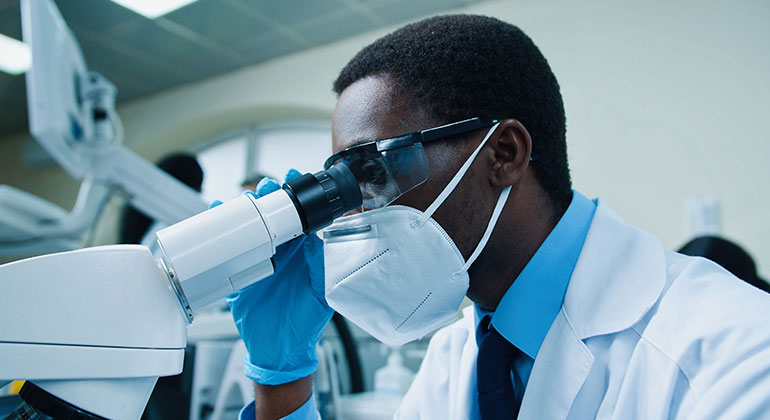Mount Sinai Receives NIH Grant to Increase the Engagement of African Americans in Colorectal Cancer Screening
Mount Sinai researchers have received a grant from the NIH to determine why African Americans are less likely than others to receive colorectal cancer screenings.
Researchers at the Icahn School of Medicine at Mount Sinai have received a multi-year National Institutes of Health (NIH) grant to determine factors which may influence why African Americans are less likely than others to receive colorectal cancer (CRC) screenings, despite having the highest CRC incidence and mortality of any ethnic/racial group in America.
“The short-term goal of this study is to understand why there is a lower screening prevalence among African Americans, and the long-term goal is to develop and disseminate effective intervention strategies to increase the CRC screening in this population, so that we can eliminate the race-related disparity in morbidity and mortality,” said Lina Jandorf, MA, Research Professor in the Department of Oncological Sciences at Mount Sinai and a principal investigator in the study.
Colorectal cancer is the second leading source of cancer deaths and the third leading source of new cancer cases in the United States. The mortality rate for CRC is a remarkable 49 percent higher for African Americans than for whites, according to the American Cancer Society. Improving CRC screening rates is important for early detection, treatment and improved survival rates.
Researchers at Mount Sinai, Roswell Park Cancer Institute in Buffalo, NY and the University of Buffalo seek to enroll 900 study participants as part of the four-year, $2.6-million grant. They will compare the effectiveness of two approaches to educating African Americans over the age of 50 about the need for screening. One is a “narrative” approach and involves story telling – i.e. encouraging participants to talk about their fears and thoughts associated with a colonoscopy screening. The other approach is “didactic” – giving patients “just the facts” about the disease and the colonoscopy procedure. Based on their findings, the research team hopes to develop new tools for educating African Americans about screening.
“While researchers have compared the success of narrative vs. didactic community education approaches for other cancers, this is the first such major comparative study for colorectal cancer in African Americans,” said Professor Jandorf. “Mount Sinai’s involvement in this study reflects our ongoing commitment to improving the health of our local community, much of which is African American.”
Under Professor Jandorf’s direction, Mount Sinai has extensive experience in conducting investigations and developing successful strategies to improve colon cancer screening rates for Hispanics, East Harlem residents and low-income minorities.
About The Mount Sinai Medical Center
The Mount Sinai Medical Center encompasses both The Mount Sinai Hospital and Icahn School of Medicine at Mount Sinai. Established in 1968, the Icahn School of Medicine is one of the leading medical schools in the United States, with more than 3,400 faculty in 32 departments and 14 research institutes. It ranks among the top 20 medical schools both in National Institutes of Health (NIH) funding and by U.S. News & World Report. The Mount Sinai Hospital, founded in 1852, is a 1,171-bed tertiary- and quaternary-care teaching facility and one of the nation’s oldest, largest and most-respected voluntary hospitals. The Mount Sinai Hospital is nationally ranked by U.S. News & World Report as one of the top 25 hospitals in 7 specialties based on reputation, safety, and other patient-care factors.
For more information, visit http://www.mountsinai.org/.
Find Mount Sinai on:
Facebook: http://www.facebook.com/mountsinainyc
Twitter @mountsinainyc
About the Mount Sinai Health System
Mount Sinai Health System is one of the largest academic medical systems in the New York metro area, with more than 43,000 employees working across eight hospitals, over 400 outpatient practices, nearly 300 labs, a school of nursing, and a leading school of medicine and graduate education. Mount Sinai advances health for all people, everywhere, by taking on the most complex health care challenges of our time — discovering and applying new scientific learning and knowledge; developing safer, more effective treatments; educating the next generation of medical leaders and innovators; and supporting local communities by delivering high-quality care to all who need it.
Through the integration of its hospitals, labs, and schools, Mount Sinai offers comprehensive health care solutions from birth through geriatrics, leveraging innovative approaches such as artificial intelligence and informatics while keeping patients’ medical and emotional needs at the center of all treatment. The Health System includes approximately 7,300 primary and specialty care physicians; 13 joint-venture outpatient surgery centers throughout the five boroughs of New York City, Westchester, Long Island, and Florida; and more than 30 affiliated community health centers. We are consistently ranked by U.S. News & World Report's Best Hospitals, receiving high "Honor Roll" status, and are highly ranked: No. 1 in Geriatrics and top 20 in Cardiology/Heart Surgery, Diabetes/Endocrinology, Gastroenterology/GI Surgery, Neurology/Neurosurgery, Orthopedics, Pulmonology/Lung Surgery, Rehabilitation, and Urology. New York Eye and Ear Infirmary of Mount Sinai is ranked No. 12 in Ophthalmology. U.S. News & World Report’s “Best Children’s Hospitals” ranks Mount Sinai Kravis Children's Hospital among the country’s best in several pediatric specialties.
For more information, visit https://www.mountsinai.org or find Mount Sinai on Facebook, Twitter and YouTube.

Scientists Create Most Powerful, Accurate Tool Yet to Research Deadliest Blood Cancer
Apr 18, 2023 View All Press Releases
Study Identifies New Gene That Drives Colon Cancer
Oct 14, 2022 View All Press Releases
Molecular Treatment Is Able to Control Brain Metastasis of Different Tumors
Feb 11, 2022 View All Press Releases


